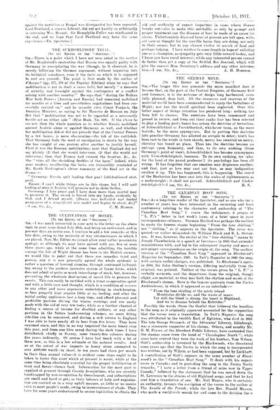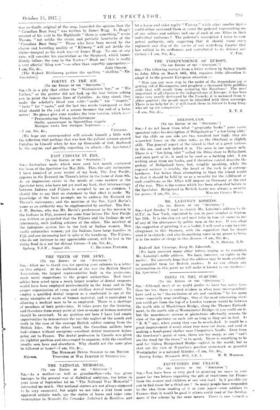THE CANADIAN BOAT SONG.
[To THE EDITOR OP THE SPLCIRTOR."1
San,—As a long-time render of the Spectator, and as one who for an number of yens has been interested in the recurring anal keen controversy relating to the character and authorship of "The Canauliau Boat Song," I crave the indulgence, is propos of "L. P.'s" letter in last week's issue, of a brief space in your correspondence columns. Norman Macleod was perhaps the earliest to quote the famous stanza beginning " From the lone shieling," not "shelling," as it appears in the Spectator. The verse Was quoted—or rather misquoted—by William Black and R. L. Steven. son. It was, however, the recital of the " lone shieling " stanza by Joseph Chamberlain in a speech at Inverness in 1885 that extended acquaintance with, and led to the subsequent inquiry and notes of newspaper correspondence on the origin of, the song. The earliest version of the "Canadian Boat Song" appeared in Blackwood's Magazine for September, 1829. In Tait's Magazine in 1849 the song. with certain verbal changes, was published. In Blackwood's again, in 1889, Sir John Skelton's version, differing materially from the original, woo printed. Neither of the verses given by "L. P." is verbally accurate, and the departures from the original, though slight, are material, as they mar both the rhythm and music of the Blackwood's stanza. Here is the famous quatrain from the Nodes Anabrosianac, in which it appeared as an interlude:-
" From the lone shieling of the misty island
Mountains divide us, and the waste of seas—
Yet still the blood is strong, the heart is Highland, And we in dreams behold the Hebrides."
Possibly the words (from the Gaelic) that followed the headline to the song as it originally appeared accounted for the supposition that the verses were a translation. In Tait's Magazine the song was attributed to the twelfth Earl of Eglinton, who died in 1819. The late George Stronach. of the Advocate.' Library, Edinburgh, was a strenuous supporter of his claims. Others, and notably Mr. G. M. Fraser, of the Aberdeen Public Library, have contended that the stanzas came from the hand of "Christopher North"; while S01110 have avowed they were the work of his brother, Tom Wilson. Galt's authorship is favoured by the Blackwoods, who discovered some years ago that the Noctes in which the song is incorporated was written, not by Wilson, as had been supposed, but by Lockhart. A contribution of Galt's appears in the same number of Black- wood's as the " Canadian Boat Song." It deals with his experi- ences in Canada; and in preluding the song in the Noctes North remarks, " I have a letter from a friend of mine now in Upper Canada," followed by the statement that ha was rowed down the St. Lawrence to the strains of old Maitland songs, and that he had sent him a translation of one. Ito Neil Munro, who is certainly an authority, favours the ascription of the verses to the author of The Annals of the Parish; while the late Bev. Donald Masson, who made a world-side search for and came to the decision the, was no Gaelic original of the song. hazarded the opinion that the "Canadian Boat Song" was written by James Hogg. In Hogg's account of his visit to the Highlands " there is something," wrote Mason, "not unlike the strain and patriotic heartache of the ' Canadian Boat Song.'" Those who have lwen moved by the charm and haunting quality of "Kilmeny " will not deride the claim—unequal as his work was—of James Hogg. No one, at any rate, will consider his ejaculation as the Shepherd, which imme- diately follows the song in the Nactes—" Heal, me! this is really a very afteetin' thing now "—as other than superbly appropriate.- ] am, Sir, tic., Sons DRIDOR. [The Oxford Dictionary prefers the spelling " sheiling."—En. Spectator.]



































 Previous page
Previous page